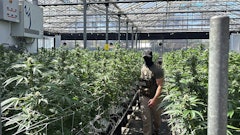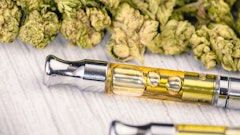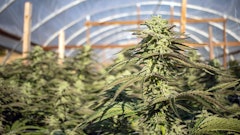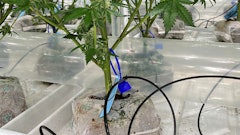
Has your business added hemp-derived delta-9 THC products to its menu?
Many U.S. hemp companies have begun selling products that contain delta-9 THC, the cannabinoid that differentiates hemp from cannabis. These companies market these products as hemp-derived and federally compliant under the 2018 Farm Bill, claiming they contain less than the 0.3% THC limit set for hemp.
How are these products getting on shelves?
As previously reported by Cannabis Business Times, companies are creating these delta-9 products by making them weigh enough using other ingredients to remain within that 0.3% THC limit.
Still, there is much legal controversy around these products and how a "dry-weight" basis is measured.
RELATED: Delta-9 in Edible Hemp Products: What's a 'Dry Weight Basis' Anyway?
In September, Rod Kight, principal and founder at Kight Law Office, told CBT that some products with high amounts of delta-9 THC are legal. "Additionally, and importantly, the water weight must be removed in the calculation since the 2018 Farm Bill measures THC concentrations on a 'dry weight' basis," Kight said. "In practical terms, this means that some products, such as gummies, will be easier and more cost-effective to manufacture compliantly than other types of products, such as bottled water."
But Shawn Hauser, partner at Vicente Sederberg and chair of the firm's Hemp and Cannabinoids Department, had a different perspective than Kight and argued that these products infringe on state and federal hemp laws.
"It appears that these companies are looking at the 0.3% by dry-weight standard that's in the farm bill and determining the legality of their products," Hauser said. "And the inherent flaw with that [interpretation] is that [the 2018 Farm Bill] said, 'a dry-weight basis.' That, by nature, doesn't account for moisture and the weight of the gummy material or whatever is in the oil."
Marshall Custer, partner at Husch Blackwell law firm in Denver, Colo., has a similar viewpoint to Hauser.
Custer says his firm has worked with large hemp manufacturers and multistate operators (MSOs) who refrain from selling these products but have sold them in the past. "Some of them will filter [those products] out, realizing, 'Hey, this isn't a long-term play,'" he says.
Despite the legal controversy around these products, Custer says there are significant legal considerations for businesses that have or are looking to add hemp-derived delta-9 to their offerings.
Implement Proper Manufacturing Practices
Custer says some of the questions businesses should ask themselves are: "What's the quality of my manufacturing program?" or "Am I incredibly sure that I'm making almost pharmaceutical-grade products when I send them out to the market, and do our labels accurately reflect what is in the product?"
Custer says while the federal government may not come after every business that mislabels products, you're still a target for plaintiff's lawyers.
"If somebody gets hurt from your product, you better believe there are plenty of plaintiff lawyers out there who will make a living tracking you down and suing you for everything you've got," he says. "And it's the deep pockets that typically have the most to worry about. If they're an MSO and are selling these kinds of hemp products, they've got a big target on their back, which is why they are typically careful and shy away from that stuff."
Don't Make Health Claims
Custer says it's crucial not to advertise health claims on your products, as it increases your chances of the U.S. Food and Drug Administration (FDA) taking action.
Since 2015, the federal agency has already issued 79 warning letters to CBD companies, with the most recent batch of letters sent out in March and April to seven companies who claimed their CBD products could treat COVID-19. And now, for the first time the FDA is issuing warning letters related to delta-8 THC.
On May 4, the federal agency sent warning letters to five companies “for selling products labeled as containing delta-8 tetrahydrocannabinol (delta-8 THC) in ways that violate the Federal Food, Drug, and Cosmetic Act (FD&C Act),” CBT reported.
Custer says his firm often conducts labeling reviews for many clients, especially on the supplement side. "With that, we'll review the labeling on the actual product, and then we'll want to trace back and say, 'Hey, tell me the lab that you used to come up with these numbers on here.' And then we'll want to see what sort of accreditation and standards the lab is using to make sure they are [following proper procedures]."
From there, they ensure there are no health claims on the bottle, Custer says. Aside from product labels, he says it's also essential to ensure you're not making these claims in your marketing efforts.
"You've got to look at your marketing, your website, and your social media presence because all of that ties in as well," he says, adding that in working with clients, he often receives pushback from the marketing team when telling them to refrain from these claims.
"If the marketing people [are like], 'Hey, this is what sells our product,'… we've got to push back very firmly and say, 'If you're selling any sort of hemp-derived cannabinoid, you've got to understand the person buying it is kind of making their own informed decision as to why [they are buying it],'" he says. "CBD is a great example. The FDA says it's a drug. It's Epidiolex approved for a specific condition. You can't be sitting there and saying that it does anything else unless you've run through clinical trials, and you have the data to back it up. And then in that case, [you can] start talking to the FDA about it."
Purchase the Right Insurance Policy
Custer suggests hemp businesses purchase general business liability insurance and ensure substantial product liability coverage is included in the policy.
"The biggest mistake I see people make is they'll talk to an insurance broker who will write them a policy because brokers are salespeople; they'll sell you a policy. And then when they read the fine print when a claim comes up, they realize everything that they want to be covered for selling hemp products is excluded from the policy," he says.
He adds that he used to encounter that issue a lot more with clients in the past, but now there are a handful of insurance carriers specializing in cannabis or hemp that will write a policy with the correct coverage.
"This [also] tends to be a good vetting procedure," he says. "If you can get insurance from a reputable carrier doing what you are doing, you've probably got a pretty good process in place because the reputable carriers [today] have a very good [due] diligence system."


























